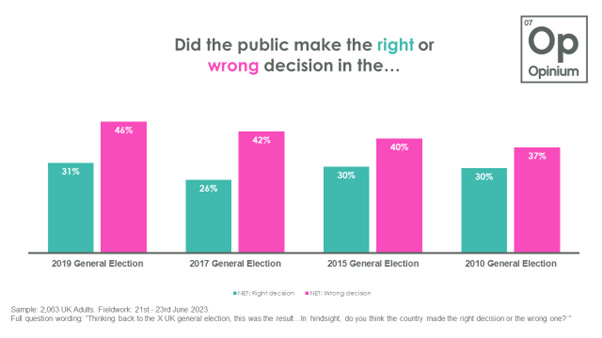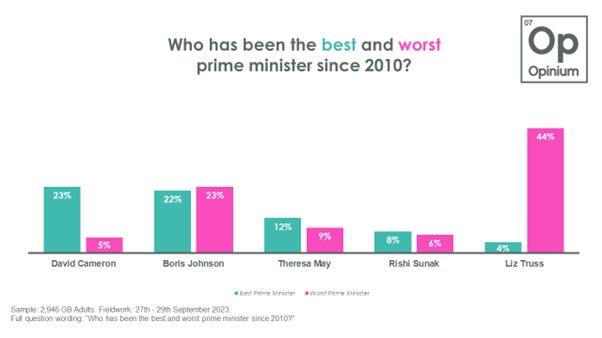Why David Cameron represents, of all things, change

David Cameron is back. The first prime minister to return to government since Alec Douglas-Home. However, his length of service as premier and party leader is worth remarking on, meaning that he is stepping into the Foreign Office with a big reputation, or a lot of baggage, depending on your point of view.
Who Cameron appeals to and who he makes nervous can tell us a lot about the most recent re-shuffle. Many have seen it as a nostalgia-only lack of change, unhelpful for a Conservative party that is trying to change its way to a better polling performance. However, others have seen it as a coup for a resurged ‘centrist’ Conservatism in an attempt to bring back Blue Wallers that are considering switching to the Lib Dems or Labour.
Like the public, Opinium has (albeit quite cheekily) tried to assess Cameron’s performance in the past. In June, we asked the public if they thought UK politics would be more or less chaotic if Ed Miliband had become Prime Minister in 2015 and beaten David Cameron. Results were relatively balanced, with 28% thinking it would have been more chaotic and 33% thinking it would have been less.
This isn’t a bad showing for David Cameron, whose electoral performance is much less regretted that other results. When comparing against other elections, the 2010 and 2015 elections registered as having the lowest regret of the past 13 years. 46% think the outcome of the 2019 general election as the wrong decision and 42% think the 2017 general election outcome was the wrong decision.
2010, in particular, is well thought of amongst 2019 Conservatives (+28% net the right decision) and is pretty split amongst 2019 Lib Dems (-6% net). With a third (32%) of 2019 Lib Dem voters and half (50%) of 2019 Conservatives believing the UK got 2010 right, there is a loose coalition between more liberal-minded Conservatives and right-wing Liberal Democrats who aren’t as upset at the coalition as their implosion in 2015 might imply. The Cameron appointment may just successfully appeal to that base.
But election results skirt past the man himself. Where Cameron has a real hold on Liberal Democrats is on a personal basis. When, in September, we asked who people thought the best Conservative Prime Minister of the past 13 years was, Cameron came tops. He sat at 23%, just pipping Boris Johnson at 22%. Cameron did best amongst 2019 Liberal Democrats, 30% of whom said Cameron was the best prime minister since 2010. This is in contrast to 2019 Conservatives, 19% of whom said Cameron was best. They are more likely to back Johnson, on 42%.
Therefore, the Cameron hire is a change in tack from the 2019 Conservatives’ voter strategy. The popularity of Cameron with Liberal Democrats tips off that the Sunak government is trying to pull from a different pool than 2019.
It is yet to be seen whether bringing David Cameron back into frontline politics will make much of a difference. He may be too tainted by Brexit or too marred by Greensill to cut through to this key audience, or maybe they won’t notice after this week. However, this hasn’t stopped Sunak trying. In the context of kicking out Suella Braverman, it seems that the Conservatives are moving away from the right wing of their party and further to the centre. This may be too little too late, but Conservatives may be thinking a little late is better than never at all.
Written by Calum Weir, researcher at Opinium.




